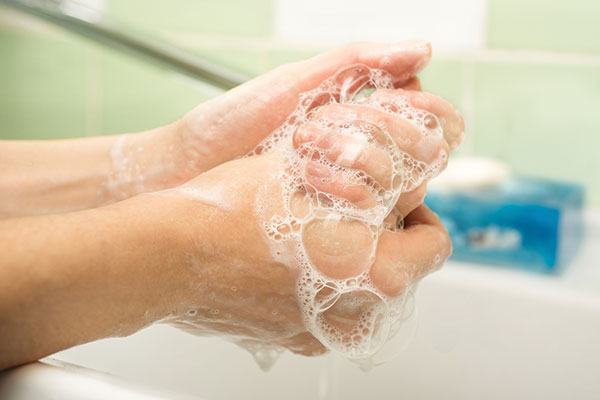Protect Yourself from Infection
by Kimberly Wilson, RN, BSN, CIC, Jillianna Wasiura, RN, BSN, CIC, and Brahm H. Segal, MD
Infections are illnesses caused by microorganisms (germs) such as bacteria, viruses, and fungi. People with cancer may be at increased risk for infections for a number of reasons.
The cancer itself may compromise the immune system, which is what protects the body from infection. For example, certain cancers of the blood may inhibit the body’s ability to make normal white blood cells that fight infection. In addition, cancer treatments such as chemotherapy and radiation therapy can decrease the number of healthy white blood cells.
Neutrophils are a specific type of white blood cell that have a particularly important role in protecting the body from infection. Neutropenia, or low neutrophil count, can result from certain types of cancer treatment, and the longer the duration of neutropenia, the greater the risk of infection. Other medicines used in cancer therapy (such as steroids) can also weaken the immune system.
It’s important for people receiving cancer treatment to be alert for signs of infection and report them to their physician. Signs of infection include fever, cough, and skin that is red, tender, and swollen.
Different types of medications are used to treat infections. The most common are antibiotics to treat bacterial infections. Antiviral and antifungal medications are also sometimes used to treat infections in people with cancer. Some people who are at high risk for infections may be prescribed medications to reduce the risk of infection. People with neutropenia who develop a fever require prompt evaluation and treatment.
Your skin is your first line of defense in preventing infections from entering your body, so it’s important to maintain good personal hygiene.
Keep in mind that there are many kinds of cancer and cancer treatments with different levels of infection risk. Your oncologist can educate you about the risk of infections associated with your specific cancer and treatment and what can be done to prevent them. However, there are also some general guidelines you can follow to reduce your risk of infection.
Taking infection prevention into your own hands has a very literal translation. Practicing good hygiene is one of the best methods for preventing infections. If your hands are visibly dirty, you should vigorously wash them with soap and water for at least 20 seconds. It’s OK to use alcohol-based hand sanitizers when soap and water is not available. Always wash or sanitize your hands before eating, drinking, or taking medication; after using the bathroom, coughing, sneezing, or blowing your nose; before touching your eyes, nose, or mouth; before and after performing any care involving intravenous lines, catheters, or bandages; and after touching things that are frequently touched by others. It is also important for your healthcare providers, family, friends, and caregivers to wash or sanitize their hands before touching you.
Your skin is your first line of defense in preventing infections from entering your body, so it’s important to maintain good personal hygiene. The first step to ensuring good hygiene is to bathe or shower regularly with mild soap. Change towels daily, and do not share towels with others. Regularly inspect your skin closely for rashes, redness, signs of infection, or cuts that do not heal properly. Use a soft toothbrush to clean your teeth after meals and before going to bed. Keep bandages dry. If they become wet, change them promptly. If you have an intravenous catheter, specific precautions are required to keep it clean and dry.
It’s important to talk to your doctor before receiving vaccines because live vaccines can potentially be harmful to people with certain types of cancer.
In addition, you should keep away from people who have infections that are easily transmitted, such as a cold or the flu. If this isn’t possible, try to reduce direct contact and practice good hand hygiene. Do not handle animal excrement; have someone else help care for your pet. Eat a well-balanced diet. Thoroughly wash fruits and vegetables before eating them. Do not eat spoiled or expired foods, don’t consume raw meat or seafood, and stay abreast of any foodborne disease outbreaks in your community.
Ask your doctor about vaccines that prevent illness. It’s important to talk to your doctor before receiving vaccines because live vaccines can potentially be harmful to people with certain types of cancer. Encourage family, friends, and caregivers to be immunized as well.
Empowering yourself is one of the most important things you can do to prevent infections during cancer treatment. You have the right to ask everyone who participates in your care to wash their hands. Make sure that anyone who visits you is healthy, and don’t be afraid to ask questions when you’re unsure. Contact your healthcare team if you suspect you may have an infection. Infections caught early are easier to treat.


Kimberly Wilson (top left), now retired, is a former senior infection prevention and control coordinator at Roswell Park Cancer Institute in Buffalo, NY.
Jillianna Wasiura (right) is a senior infection prevention and control coordinator.

Dr. Brahm Segal (bottom left) is chief of Infectious Diseases, both at Roswell Park Cancer Institute.
To learn more about preventing infections during cancer treatment, visit PreventCancerInfections.org.
This article was published in Coping® with Cancer magazine, September/October 2017.


